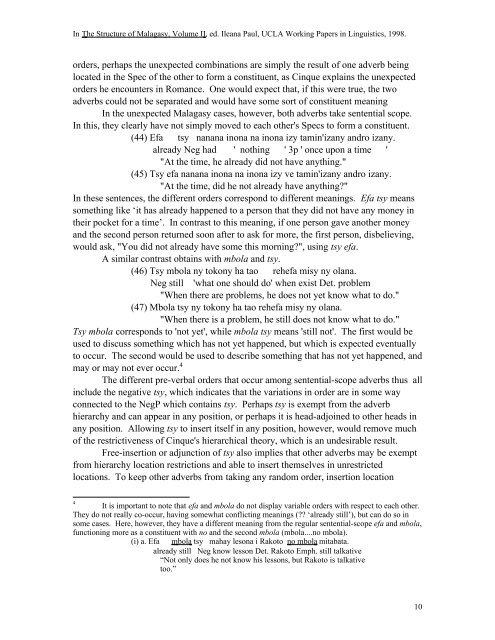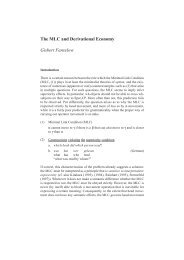Malagasy Adverbs Andrea Rackowski McGill University August 1996
Malagasy Adverbs Andrea Rackowski McGill University August 1996
Malagasy Adverbs Andrea Rackowski McGill University August 1996
You also want an ePaper? Increase the reach of your titles
YUMPU automatically turns print PDFs into web optimized ePapers that Google loves.
In The Structure of <strong>Malagasy</strong>, Volume II , ed. Ileana Paul, UCLA Working Papers in Linguistics, 1998.<br />
orders, perhaps the unexpected combinations are simply the result of one adverb being<br />
located in the Spec of the other to form a constituent, as Cinque explains the unexpected<br />
orders he encounters in Romance. One would expect that, if this were true, the two<br />
adverbs could not be separated and would have some sort of constituent meaning<br />
In the unexpected <strong>Malagasy</strong> cases, however, both adverbs take sentential scope.<br />
In this, they clearly have not simply moved to each other's Specs to form a constituent.<br />
(44) Efa tsy nanana inona na inona izy tamin'izany andro izany.<br />
already Neg had ' nothing ' 3p ' once upon a time '<br />
"At the time, he already did not have anything."<br />
(45) Tsy efa nanana inona na inona izy ve tamin'izany andro izany.<br />
"At the time, did he not already have anything?"<br />
In these sentences, the different orders correspond to different meanings. Efa tsy means<br />
something like ‘it has already happened to a person that they did not have any money in<br />
their pocket for a time’. In contrast to this meaning, if one person gave another money<br />
and the second person returned soon after to ask for more, the first person, disbelieving,<br />
would ask, "You did not already have some this morning?", using tsy efa.<br />
A similar contrast obtains with mbola and tsy.<br />
(46) Tsy mbola ny tokony ha tao rehefa misy ny olana.<br />
Neg still 'what one should do' when exist Det. problem<br />
"When there are problems, he does not yet know what to do."<br />
(47) Mbola tsy ny tokony ha tao rehefa misy ny olana.<br />
"When there is a problem, he still does not know what to do."<br />
Tsy mbola corresponds to 'not yet', while mbola tsy means 'still not'. The first would be<br />
used to discuss something which has not yet happened, but which is expected eventually<br />
to occur. The second would be used to describe something that has not yet happened, and<br />
may or may not ever occur. 4<br />
The different pre-verbal orders that occur among sentential-scope adverbs thus all<br />
include the negative tsy, which indicates that the variations in order are in some way<br />
connected to the NegP which contains tsy. Perhaps tsy is exempt from the adverb<br />
hierarchy and can appear in any position, or perhaps it is head-adjoined to other heads in<br />
any position. Allowing tsy to insert itself in any position, however, would remove much<br />
of the restrictiveness of Cinque's hierarchical theory, which is an undesirable result.<br />
Free-insertion or adjunction of tsy also implies that other adverbs may be exempt<br />
from hierarchy location restrictions and able to insert themselves in unrestricted<br />
locations. To keep other adverbs from taking any random order, insertion location<br />
4<br />
It is important to note that efa and mbola do not display variable orders with respect to each other.<br />
They do not really co-occur, having somewhat conflicting meanings (?? ‘already still’), but can do so in<br />
some cases. Here, however, they have a different meaning from the regular sentential-scope efa and mbola,<br />
functioning more as a constituent with no and the second mbola (mbola....no mbola).<br />
(i) a. Efa<br />
mbola tsy mahay lesona i Rakoto<br />
no mbola mitabata.<br />
already still Neg know lesson Det. Rakoto Emph. still talkative<br />
“Not only does he not know his lessons, but Rakoto is talkative<br />
too.”<br />
10
















